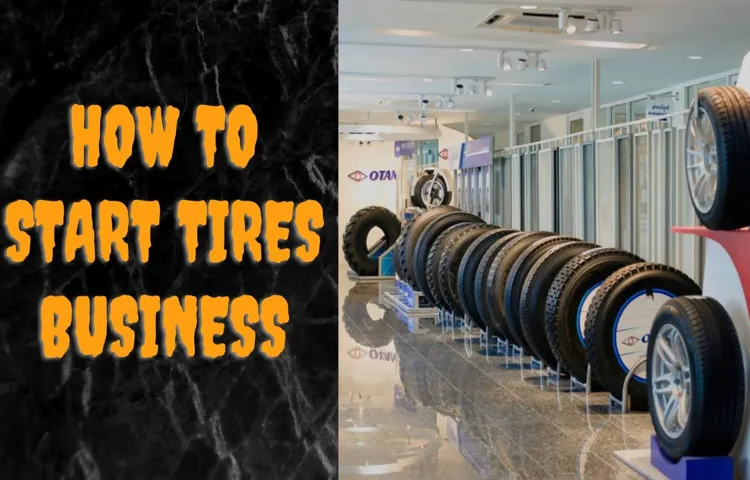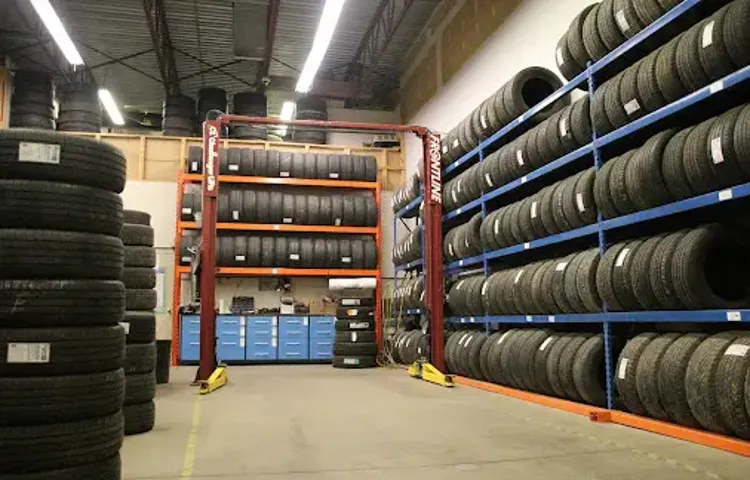Opening a tire shop isn’t easy, but it can be an incredibly fulfilling venture. The automotive industry can prove to be an intimidating field, but with the right tips and tricks, you can start your own tire shop in no time. Whether you’re an experienced mechanic or a novice, starting a tire shop takes a lot of hard work and dedication.
But with the right strategy, it can be a profitable business that allows you to take control of your financial future. If you’re ready to take the leap and learn how to open a tire shop, you need to start by understanding the basics. You’ll need to decide on the size and location of your shop, find the right suppliers, and develop an effective marketing strategy to draw in customers.
But with a clear plan in place, you can create a business that meets the needs of both your community and your own career goals. In this guide, we’ll walk you through the essential steps to opening your own tire shop. From finances to marketing, we’ll provide you with everything you need to know to make your business a success.
So why wait? Let’s get started on your new business venture today!
Table of Contents
Market Research
When opening a tire shop, conducting market research is crucial to ensure success. First, identify your target market, such as local vehicle owners or commercial fleets, and determine their needs and preferences. Analyze the competition in your area and evaluate their strengths and weaknesses.
This information can help you differentiate your shop and offer unique services, such as mobile tire installation or extended warranties. Estimate the demand for tire services in your area based on factors such as population density and the number of vehicles. Consider factors such as location, leasing or buying of equipment, and hiring a skilled team.
With thorough market research, you can launch a tire shop that caters to the specific needs of your target market and truly stands out from the competition.
Analyze the competition
When it comes to starting a business, analyzing the competition is a critical step to ensure success. This process is known as market research, which involves gathering and analyzing information about the market, your customers, and your competitors. By understanding your competitors’ strengths and weaknesses, you can identify opportunities to differentiate yourself and gain a competitive advantage.
You can gather information about your competition by conducting online research, attending industry events, and even visiting their stores or websites to see how they operate. Knowing your competition’s pricing, marketing strategies, target audience, and product offerings can help you position your business for success. Ultimately, conducting thorough market research can help you make informed decisions and avoid costly mistakes, giving your business the best chance to succeed in a competitive marketplace.
So, don’t overlook market research when starting your business, instead make it one of your top priorities.

Determine target market
Before launching a product or service, it’s crucial to determine who your target market is. Market research is the best way to identify your potential customers’ needs, preferences, and behaviors. There are numerous ways to conduct market research, including surveys, focus groups, and competitive analysis.
By gathering this data, you can segment your audience and create more effective marketing campaigns that resonate with your target market. It’s also essential to consider factors such as demographics, psychographics, and buying behavior when defining your target market. For instance, you may decide to target a specific age group or income level, or you may focus on consumers who value sustainability or luxury.
Ultimately, taking the time to conduct market research can save you time and money in the long run by helping you hone in on the most profitable audience for your brand.
Identify ideal location
When searching for the ideal location for your business, conducting thorough market research is crucial. Market research involves gathering information about your potential customers, competitors, and the overall market trends in your industry. One effective way to conduct market research is to analyze data and statistics from government agencies, trade associations, and online databases.
Additionally, you can also conduct surveys or questionnaires to gather feedback and insights from your target audience. By conducting comprehensive market research, you’ll be able to identify the best location for your business, based on factors such as demographics, customer behavior, and competition. With this information, you can make informed decisions and position your business for success.
Remember to always keep your ideal customer in mind and choose a location that will provide the most convenience and accessibility for them. By doing so, you’ll be on your way to building a strong foundation for a thriving business. The primary keyword used in this paragraph is “Market Research”.
Business Plan
If you’re interested in starting your own tire shop, you’ll need a solid business plan to get started. First things first, you’ll want to research the current market and competition in your area to determine the demand for a new tire shop. From there, you’ll want to create a budget, including start-up costs such as rent, inventory, and marketing expenses.
It’s important to identify your target customers and develop a marketing strategy that will reach them effectively. Additionally, you’ll need to register your business and obtain all necessary licenses and permits. It may be helpful to seek advice from a business mentor or consultant to ensure your business plan is thorough and realistic.
Overall, starting a tire shop can be a lucrative endeavor with the right planning and execution.
Determine legal structure
When it comes to starting a business, one of the crucial steps that cannot be overlooked is determining the legal structure. This decision will impact various aspects of your business, including taxation, liability, and ownership. The four primary legal structures to choose from are sole proprietorship, partnership, limited liability company (LLC), and corporation.
Sole proprietorship is the simplest and most common form, but it offers no protection from personal liability for business debts. A partnership is similar to a sole proprietorship, except that there are two or more owners, and each is liable for the debts of the business. The LLC provides personal asset protection and flexibility in taxation, with fewer regulations than a corporation.
However, a corporation offers greater protection for personal assets from business debts and a more formal structure with shareholders and a board of directors. Ultimately, you should consult a lawyer or accountant to help you determine the best choice for your business based on your unique needs and goals.
Develop financial plan
A vital component of any successful business plan is developing a solid financial plan. This involves projecting future revenue, budgeting for expenses and determining the financial trajectory of the business. To begin, it’s necessary to research industry trends and competitors to establish realistic financial projections.
Accurately forecasting future revenue can be difficult, but by analyzing past trends and compiling data from similar businesses, it’s possible to create a comprehensive estimate. The financial plan should also encompass a detailed budget that includes fixed and variable expenses. These should be prioritized to ensure that costs are controlled in line with revenue.
The financial plan should include a profitability analysis that outlines the expected profitability of the business in the short and long term. Additionally, the plan should look at the use of any available financing and outline repayment plans. By developing a thorough financial plan, businesses can ensure their operations are financially viable and sustainable.
Create marketing strategy
When it comes to creating a marketing strategy, it’s important to start with a solid business plan. This plan should include a clear understanding of your target audience, your unique selling proposition, and your financial goals. You’ll also need to consider the various marketing channels available to you, such as social media, email marketing, advertising, and content marketing.
Once you’ve outlined your goals and the channels you’ll use to reach them, it’s time to develop a plan for execution. This may involve creating a content calendar, setting a budget for advertising, or developing an email automation sequence. The key is to make sure your strategy is both comprehensive and flexible, so you can adapt as needed based on feedback and results.
By investing time upfront to create a thoughtful marketing strategy, you’ll be better equipped to reach your target audience and achieve long-term success.
Obtain Necessary Licenses and Permits
When opening a tire shop, obtaining the necessary licenses and permits is a crucial step that you cannot overlook. Regulations vary depending on the locality, so it is essential to research what is required in your area before starting the process. Generally, you will need a business license, permits to operate related equipment, zoning permits, and an environmental permit, if applicable.
Acquiring these documents may involve some paperwork and fees, so be sure to allocate enough time and resources in your budget and plan accordingly. Failure to obtain the proper permits and licenses can result in fines, closure, and legal repercussions in the future. Therefore, it’s crucial to stay compliant with all the requirements to run your business successfully.
Suppose you’re feeling overwhelmed by the legal requirements. In that case, you can work with a professional who specializes in helping entrepreneurs navigate the permit and licensing process, facilitating a smoother startup experience. Remember, every business begins with going through legal processes to ensure a stable foundation, and a tire shop is no exception.
Apply for business license
When starting a business, obtaining the necessary licenses and permits is a crucial step that should not be overlooked. One of the most important things to consider when launching your own company is the legal structure of your business. Depending on the type of business you are operating, you may have to obtain various types of licenses and permits from the federal and state government.
These permits and licenses are a way for the government to regulate and supervise the operations of businesses, to ensure that they comply with safety and health regulations, consumer protection laws, and more. You may need to apply for a business license, a tax ID number, a zoning permit, a seller’s permit, and any additional permits required by your state or municipality. Each business will have different requirements, so it is important to research what licenses and permits are required for your business and industry.
Obtaining the necessary licenses and permits will help you stay on the right side of the law and provide peace of mind that your business is operating in accordance with legal regulations.
Obtain sales tax permit
As a business owner, it’s crucial to have all the necessary licenses and permits to avoid any legal consequences. One important permit that needs to be obtained is a sales tax permit. This permit allows you to collect sales tax from customers and remit it to the government.
The process of obtaining a sales tax permit may differ from state to state, but generally, you need to register with the state’s tax agency. You may be required to provide identification, business formation documents, and other information. It’s essential to properly obtain a sales tax permit since failure to do so can damage your business reputation and lead to hefty fines.
In conclusion, make sure to do your research and comply with all the necessary regulations to keep your business running smoothly and legally.
Get environmental permits
When it comes to starting a business that impacts the environment, you must ensure that you have all the necessary licenses and permits required by law. These permits may vary depending on the type of business you are running and the location of that business. It can be time-consuming and difficult to get all of the permits you need, but it is crucial to do so to avoid being penalized by authorities.
Environmental permits are put in place to ensure that your business activities do not negatively impact the environment or health of the public. So, it’s essential to research and understand the permits required for your specific business type. Without proper environmental permits, your business may face large fines that could harm your financial standing or even force you to close your doors, so it’s best to obtain these permits as soon as possible.
By doing this, you can ensure that you’re operating your business in a lawful and responsible way that will not harm the environment.
Equipment and Inventory
Opening a tire shop requires careful consideration of the equipment and inventory needed to run a successful business. Some of the basic tools you’ll need include a tire changer, wheel balancer, air compressor, and alignment machine. Other necessary equipment may include a lift or hoist, impact wrenches, and diagnostic tools.
When it comes to inventory, you’ll need to stock a variety of tires to meet the needs of your customers. This includes everything from car and truck tires to specialized tires for farm equipment and off-road vehicles. You’ll also need to consider the brands and models you carry, as well as the pricing strategy you’ll use to stay competitive in the market.
Keeping track of your inventory levels and ordering ahead of time will help ensure that you always have the products your customers need on hand. By investing in high-quality equipment and maintaining a robust inventory, you’ll be well on your way to opening a successful tire shop.
Purchase or lease equipment
When starting a business, one of the biggest decisions you’ll have to make is whether to purchase or lease your equipment and inventory. Each option has its advantages and disadvantages, and the right choice will depend on your specific situation. If you have the funds to make a significant upfront investment and want complete control over your assets, purchasing may be the way to go.
On the other hand, if you’re just starting or need to conserve your capital, leasing can provide more flexibility and less risk. Another factor to consider is the lifespan of the equipment. If you anticipate needing to upgrade or replace it in the near future, leasing may be the better option to avoid being stuck with outdated technology.
Regardless of your choice, it’s essential to thoroughly research your options, weigh the pros and cons, and make an informed decision that aligns with your business’s goals. By doing so, you’ll be setting yourself up for success and minimizing financial risk in the long term.
Stock inventory
As a business owner, managing equipment and stock inventory can be a challenging and time-consuming task. It’s crucial to keep a detailed record of equipment and products to avoid overstocking, understocking, and theft. Inventory management software can help automate and simplify the process, making it easier to track, manage, and restock inventory.
Additionally, having an organized system in place for equipment maintenance and repairs can prevent costly breakdowns and downtime, ensuring your business runs smoothly. Remember, investing in inventory and equipment management is a small price to pay for long-term success.
Establish supplier relationships
When it comes to running a business that requires equipment and inventory, establishing strong supplier relationships is key to success. By working closely with your suppliers, you can ensure you have access to the equipment and inventory you need when you need it, avoid stockouts and delays, and even potentially negotiate better prices. One important aspect of establishing supplier relationships for equipment and inventory is communication.
It’s essential to communicate regularly with your suppliers about your needs, any changes to your requirements, and any issues you encounter. This allows your suppliers to better plan and adjust their own operations to meet your needs and provide better service. Another important consideration is reliability.
You want to work with suppliers who are reliable and can be counted on to provide the equipment and inventory you need on time and at a fair price. It’s a good idea to research potential suppliers thoroughly before committing to a working relationship, and even to test them out with small orders to evaluate their service quality. Ultimately, by taking the time to establish strong supplier relationships for your equipment and inventory needs, you can help your business run more smoothly and be better equipped to grow and expand over time.
Conclusion
In conclusion, opening a tire shop is no easy feat, but with the right combination of passion, hard work, and a solid business plan, you can make it happen. But don’t just wing it like a deflated tire on the side of the road. Make sure to do your research, secure your funding, and create a marketing strategy that will lift your business off the ground.
And remember, just like changing a tire, it takes time and patience to get the job done right. So roll up your sleeves, grab your tools, and get ready to hit the road to success with your very own tire shop!”
FAQs
What are the legal requirements for opening a tire shop?
To open a tire shop, one must obtain necessary permits and licenses from the local and state government. The shop must also comply with safety and environmental regulations.
What equipment is needed to start a tire shop?
Essential equipment for a tire shop includes tire-changing machines, wheel balancers, air compressors, tire pressure gauges, and various hand tools.
How much does it cost to open a tire shop?
The cost of opening a tire shop varies depending on the location, size, and equipment needed. However, it can range anywhere from $25,000 to $100,000 or more.
How can I attract customers to my tire shop?
Advertising through various channels such as social media, online directories, and local media outlets can help attract customers. Offering promotions and excellent customer service can help retain existing customers.
How can I stay competitive in the tire shop industry?
Keeping up with the latest tire trends and offering a wide range of tire brands and services can help stay competitive. Offering warranties and guarantees on products and services can also set a shop apart from competitors.
How do I properly dispose of old tires?
Old tires must be disposed of properly to prevent environmental damage. Many tire shops partner with recycling facilities to dispose of old tires and reuse the materials.
How do I choose the right location for my tire shop?
A good location for a tire shop should be easily accessible and visible to potential customers. Proximity to other auto-related businesses or high-traffic areas can also help generate business.



